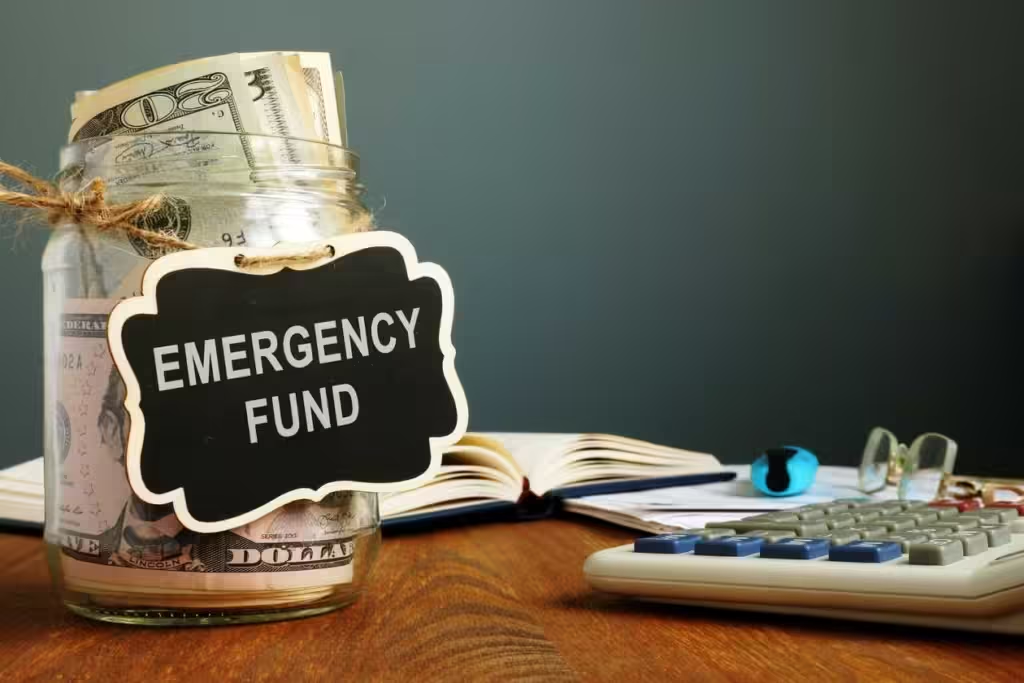Everything You Need To Know About Building an Emergency Fund in India
Life is unpredictable. Everything might seem okay now, but what if you suddenly have an emergency and need money the next minute? When faced with such an emergency and no money to cater to unexpected expenses, you might go through a lot of stress. Let’s look at everything you should know about an emergency fund.

Sometimes things happen when you least expect them.
Like your phone being stolen – now you have to buy another one. Or losing your job due to massive layoffs happening worldwide. Considering that we’re still facing the effects of the pandemic, you might even find yourself paying medical bills you didn’t plan for. All of these situations are financial emergencies that can happen at any time. Plus, unexpected expenses can hit at the worst times.
Having an emergency fund helps you pay for living expenses when you’re laid off or even during other emergencies. You can also use emergency savings to cater for other unforeseen expenses like medical bills not covered by insurance.
What is an Emergency Fund?
An emergency fund refers to money you set aside to meet unexpected expenses in cases of financial distress. It helps improve your financial security by creating a safety net.
Let’s say you’re laid off tomorrow. It might take some months before you find another job. So, how will you pay the rent, feed yourself and your family, etc., until you’ve secured a new job?
Life can be tricky and stressful if you have no savings to pay for your living expenses in such scenarios. If you have no extra cash, you may take a loan or use your credit cards, which attract high-interest rates. Instead, you can avoid the cost of borrowing emergency loans and using credit cards by having an emergency fund.
Why Do You Need An Emergency Fund?
Having a cash reserve for unexpected expenses gives you financial stability. However, the benefits of an emergency fund extend beyond that as well:
1. Keeps Your Stress Levels Down
If you live without a safety net, you are living on the edge and hoping to get by without getting into a crisis. However, when life presents an emergency which threatens your financial well-being, you can suffer a lot of stress.
It’s best to prepare for any eventuality with an emergency fund. Setting aside cash for unforeseen expenses gives you the confidence to handle unexpected events. All you need is to open a savings account and save a little daily, weekly or monthly.
2. Saves You from Making Bad Financial Decisions
What comes to mind when a financial emergency knocks on your door?
Maybe borrowing a loan or selling your property, but that can cost you. A loan attracts interest rates. In addition, failure to repay your loan leads to penalties and lowers your creditworthiness. Then there’s selling your property at a throwaway price to get cash for your emergency.
With an emergency fund, you can meet unexpected expenses without incurring further costs. Remember, good financial decisions help you build wealth.
3. Keeps You from Spending on A Whim
Storing money away from you is the best way to retain emergency money. You are tempted to spend your cash when smoothing small arises if you have it near or on a debit card. Keeping money out of immediate reach means you won’t spend it on a whim. Get a separate account and begin saving for emergencies.
Type of Emergency Funds
1. Job Loss Emergency Fund
Do you work for the Nigerian government? Or are you employed by a private company in Nigeria? The Nigerian economy is facing a lot of challenges. Many businesses are laying off workers to reduce operational expenses. You might lose your job when you least expect it.
Losing your job leaves you with no money to support your lifestyle. However, with emergency savings, you can survive while figuring out what to do next. A job loss emergency fund enables you to set money aside while working to support your life in case you’re laid off.
2. Medical Bill Emergency Fund
The cost of medical treatment in Nigeria is high, especially for diseases that need specialized treatment. Medical insurance doesn’t cover everything. So, a medical emergency fund helps pay for bills not covered by your health insurance.
3. Home Repair Emergency Fund
If you own a home, you might need some repairs from time to time. You may want to replace the roofing due to leakages, or your home might need repainting, which comes with a cost.
Such repair works might arise when you don’t have the cash. But with an emergency repair fund, you can withdraw and cater to repairs anytime.
4. Car Repair Emergency Fund
A car comes with pride and class! However, cars require maintenance, which can be costly. What if your car breaks down in the middle of Lagos city, and you don’t have even 1 INR in your pocket?
Having a car repair emergency fund saves the embarrassment of car issues and failure to meet the repair expenses.
How Much Money Should You Put in Your Emergency Fund?
The amount in your emergency fund depends on how much you spend every month. At a minimum, you need an amount to pay your living expenses for 6 months in your emergency fund.
Let’s say you spend 25000INR monthly to fund your living expenses. Then, you need to save at least 200000 INR in your emergency savings account.
Do you have people who depend on you? It could be your spouse, parents or children. If you have dependents, you should have an amount that can cater for your living expenses for 6 months in your emergency fund.
Steps on How to Build an Emergency Fund
If you’re tired of living a stressful life due to a lack of a safety net, here are some steps to help you establish an emergency fund:
1. Track your Expenses
Begin by tracking your monthly expenses. How much do you spend on travel, groceries, entertainment, fuel, and rent?
You can use an excel spreadsheet to log your 3 months’ expenditure. That gives you a baseline figure of the money you spend. However, an emergency savings calculator is also ideal for determining what you can save.
2. Budget
Budgeting gives you a baseline estimate to use as your goal. Ensure you come up with a budget that accounts for your emergency fund.
You should assign an amount towards the fund. The amount doesn’t matter; even a minor amount encourages you to build a saving culture.
3. Figure Out What to Save Every Month
Develop a monthly saving goal.
If the household expenses are 30000 INR each month, you need to save Rs 90000 in your emergency fund, which can take care of 3 months’ expenses in case of any income loss.
So, you can start saving Rs 7500 every month to have Rs 90000 by the end of the year.
4. Automate Your Emergency Savings
Savings-focused apps can help you save automatically after a purchase transaction. You only need to link your phone with other spending accounts to ensure some amount is transferred to the savings account as needed.
5. Adopt a Direct Deposit System
If you’re employed somewhere, you can divide your pay cheque and ask your employer to send part of your salary directly to the emergency fund savings account.
This way, it’s easy to fulfil the monthly saving goal without touching your account.
6. Save on Tax Refunds
The government of India offers tax refunds to taxpayers every year. You can deposit the returns into the emergency fund. Such savings boost your financial safety when an emergency arises.
7. Adjust Your Contributions Towards Emergency Savings
Do you often go on vacations, overload your card, or often eat out? Choose where you can cut down expenditures and save the cash in your emergency fund instead.
You may find it hard to forego things in your lifestyle, like buying new clothes every month, but you can definitely make it happen.
8. Bring Your Spouse Onboard
You don’t have to get a joint account with your spouse for this purpose. However, you can agree on what to save into an emergency fund and work towards it.
Your spouse can help save when shopping for groceries and other items. Such savings can then go into emergency savings.
Where Should You Keep Your Emergency Fund Safely?
- Keep your money in a high-yield and safe savings account
- Store your money in an easily accessible savings account with a high-interest rate
- Money market accounts are also a good option
Situations When You Should Spend Your Emergency Fund
- To meet financial obligations caused by job loss
- Pay medical expenses that your insurance provider does not cover
- Pay for emergency travel expenses
- To finance expenses arising from unexpected home repairs
Where Can I Invest My Emergency Fund?
- Consider a certificate deposit with a bank
- Invest in sovereign treasury bills
- Choose the fixed deposit option from Indian banks
- Invest in Mutual fund.
Conclusion
Long story short – set money aside to pay for unplanned financial expenses when they arise. An emergency fund offers significant financial safety. Without money to meet unexpected financial needs, you can struggle with anxiety and stress. Plus, emergency funds keep you from making regrettable financial decisions, like taking expensive loans to finance emergencies.
You can invest your emergency funds in high-yield interest, money market accounts or bitcoin networks and grow your emergency savings. Mutul Fund allows you to invest in INR, build on your small mutulfund savings and get high returns, helping you grow your emergency fund tremendously.
FAQs
1. Which fund is best for an emergency?
A savings account is an ideal choice because you can get liquidity when an emergency happens.
2. Where can I put the money instead of a bank?
- High-yield checking accounts
- Certificate of deposits
- Money market accounts
3. What’s the 50-30-20 budget rule?
A 50-30-20 rule is a budgeting technique where 50% of your income goes to pay for your needs, 30% for your wants, and 20% for paying debts or into savings.
4. How do I calculate my emergency fund?
You can use an emergency fund calculator. Alternatively, you can add up your monthly living expenses and multiply them by 3 or 6.
5. How do you grow your emergency fund?
- Keep on saving
- Invest in a high-yield savings account
- Invest in money market accounts
- Invest in mutual funds
- Invest in dollars with high returns







Leave a Comment
You must be logged in to post a comment.